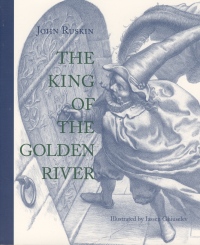| ________________
CM . . .
. Volume XII Number 13 . . . .March 3, 2006
In traditional folkloric tradition, this is the story of three brothers: two older nasty brothers and kind-hearted 12-year-old Gluck. They lived in a very productive valley which provided them with much wealth. Despite their fortune, Hans and Schwartz had never given "so much as a penny or a crust in charity; they never went to mass; grumbled perpetually at paying tithes; and were, in a word, of so cruel and grinding a temper, as to receive from all those with whom they had any dealings, the nick-name of the 'Black Brothers.'”
When Gluck peers out, he is confronted by a very strange little man dressed in doublet, billowing cape and a large hat topped by a three-foot long feather. Despite the admonishments of his brothers not to let anyone enter while they are out, he invites the man in. On the brothers’ arrival home, they are furious and turn the old fellow out. Because of their cruelty, the man, The South West Wind, ruins their farm and the surrounding valley. They are reduced to poverty and, as a last resort, melt down Gluck's golden mug that releases the King of the Golden River from his enchantment. Gluck is bid by the King to climb to the top of the mountain and pour three drops of holy water into the Golden River thus turning it into gold. True to form, when the older brothers hear of this, each attempts the journey but resorts to trickery and cruelty to those they meet along the way. Consequently they receive their "just desserts" and are transformed into black stones. Gluck, on the other hand, displays his usual kindness and is rewarded. First published in the mid-1800s and written for the girl who would later become his wife, this classic fable by John Ruskin has been beautifully illustrated by Iassen Ghiuselev. The book has a very elegant and spacious feel. The heavy off-white paper is edged with a narrow coloured band simulating matte gold. Generous borders surround the illustrations and wide-spaced text. Each chapter is faced with a small vignette and number emphasizing the spaciousness. The illustrations, which range from double spreads to small vignettes, are rendered in what appears to be soft grey pencil. All are subtly shaded and rich in details. In many of the full-page illustrations, the background is merely hinted at thus causing the viewer to focus on the central action and characters. Several are softly coloured reminiscent of old hand-tinted photos. The medieval setting is emphasized by the depiction of buildings and clothing typical of the 17th century. With its old-fashioned language, this book may not appeal to all. However, for more sophisticated readers of fairytales, the story is well told, containing many folkloric elements and satisfying action. Recommended. Marilynne V. Black is a former B.C. elementary school librarian who completed her Master of Arts in Children's Literature at the University of British Columbia in the spring of 2005.
To comment
on this title or this review, send mail to cm@umanitoba.ca.
Copyright © the Manitoba Library Association. Reproduction for personal
use is permitted only if this copyright notice is maintained. Any
other reproduction is prohibited without permission.
NEXT REVIEW |
TABLE OF CONTENTS FOR THIS ISSUE
- March 3, 2006.
AUTHORS |
TITLES |
MEDIA REVIEWS |
PROFILES |
BACK ISSUES |
SEARCH |
CMARCHIVE |
HOME |
